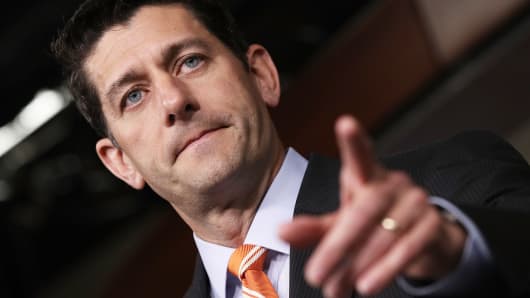The plan is less courageous, but at least on the right track, when it proposes changes to the Social Security Disability Insurance program. The Congressional Budget Office says Social Security spending overall was $905 billion in fiscal year 2016 and the Disability Insurance part of that was roughly $145 billion of that, or 16 percent.
The new GOP budget plan looks to cut disability spending somewhat by barring payments to those Americans on the program who are also receiving unemployment insurance benefits. In other words, the closest the House Republicans are willing to get to Social Security's standing as the "third rail of American politics" is proposing a plan to put a small dent in a sub-program that makes up only 16 percent of overall Social Security spending.
So they're baby steps, but still steps.
Of course Democrats in Congress and the news media will still depict these proposed changes to Medicare/Medicaid and Social Security as proof that Republicans hate old and sick people. This is important to mention because that kind of pressure has often worked to get wobbly politicians to fall off the debt cutting wagon.
But that's the pressure from the left. The right in America has been a potent opponent of cutting the third part of that holy trinity of budget items also known as defense. The House Budget Committee plan's biggest failing is that it not only fails to cut defense spending, but it actually boosted spending to $621 billion.
That's more than even the Trump White House requested. This is especially galling as the Pentagon continues to beseech Congress to approve money saving base closings, but the politicians from both parties simply don't have the guts to do it. In fact, while the Pentagon is only asking for $2 billion in annual cuts from base closings, there's much more money to be saved by focusing on closing U.S. bases on foreign soil alone. The annual price tag for those foreign bases is $156 billion.
Again, let's look at the realities here. Last year alone, defense, Social Security, and Medicare/Medicaid made up 79 percent of total spending in the budget. And while we can debate the sustainability of defense spending, the very people in charge of running Social Security and Medicare/Medicaid have been warning us of the impending insolvency for those programs for years.
So while squabbles about funding PBS, Planned Parenthood, and even education make headlines and fuel debate all the time, don't believe any politician who claims to be a deficit hawk unless he or she has a very public plan to reform all three of the key components of our budget and our debt. And yes, that also makes addressing and fixing our spending problems more important than tax reform or even health insurance reform.
For all the experts who say Congress and the Trump team can't do tax reform until they fix or replace Obamacare, the reality is the budget needs to be fixed before anything else. Tax cuts or even a repaired private health insurance market are nothing compared to the hundreds of millions of Americans who rely on Medicare, Medicaid, Social Security, and all 325 million Americans who need a strong defense for national security.
The House Republicans have at least begun this conversation. When will some other Washington politicians have the guts to join in?
Commentary by Jake Novak, CNBC.com senior columnist. Follow him on Twitter @jakejakeny.
For more insight from CNBC contributors, follow @CNBCopinion on Twitter.



